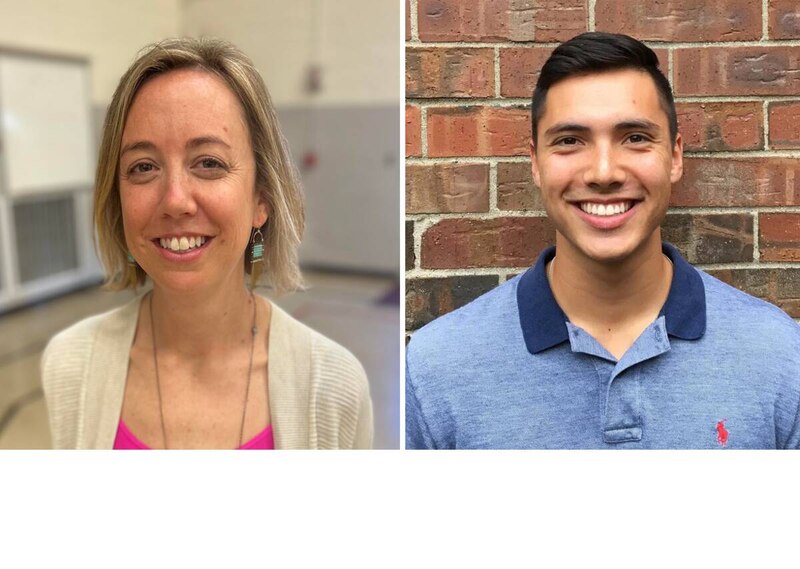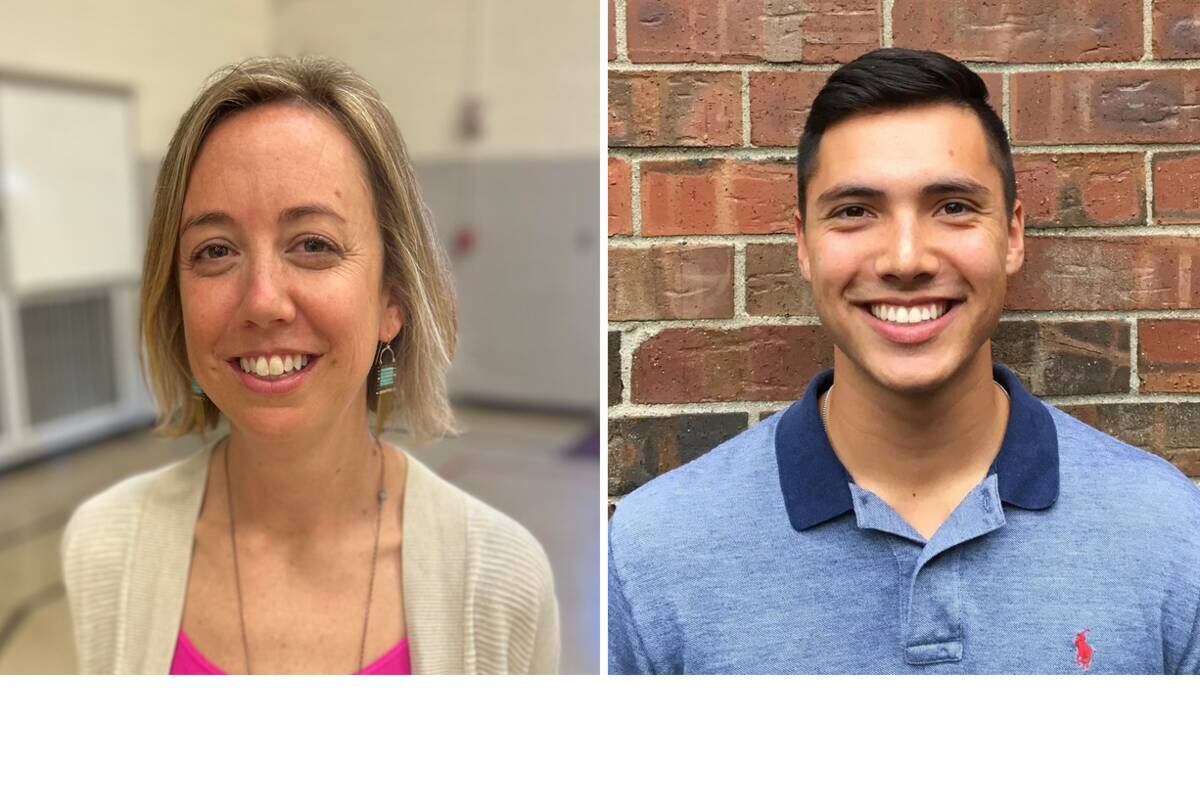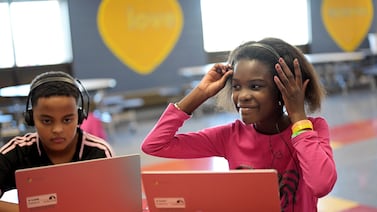Indianapolis Public Schools named two Teachers of the Year in surprise announcements on the last day of Teacher Appreciation Week.
The award goes to one educator each at the elementary and secondary level who is nominated by a school principal to represent the best in excellent teaching and accomplishments. Local Teachers of the Year may choose to compete in the statewide Teacher of the Year competition run by the Indiana Department of Education.
Below, Brandon Denning and Robin Houdek answer questions about their work and reflect on the joy of hands-on learning, the importance of reflecting on their teaching practices, and what teaching means to them.

Embracing the arts and unpredictability while teaching
Robin Houdek, the K-6 winner, works with teachers at Butler Lab School 55 to incorporate hands-on activities into their curriculum. She is called an “atelierista,” a term from the Reggio Emilia philosophy of learning that Butler Lab schools adopt. The Reggio Emilia style of teaching embraces the theory that children have multiple modes of expression and understanding, and emphasizes learning through the environment and participation.
She studied at Indiana University’s School of Fine Arts, later earning a master’s degree in art teaching from the School of the Art Institute of Chicago. She’s also a former IPS student.
What was your own education experience in IPS?
Houdek attended the now-closed Key Learning Center, which was based on Howard Gardner’s theory of multiple intelligences that people have different capabilities in processing information.
As a student at Key, Houdek learned in an environment where art was valued as much as reading and math, she said.
At Shortridge Junior High, Houdek also participated in the performing arts program.
“I learned a lot about intrinsic motivation as a young child so I think that had the biggest impact on me,” she said. “But I didn’t realize it until down the road in life when I got in more traditional settings and was able to see how much that progressive, non-traditional experience shaped just my learning and life.”
How do you incorporate art into your role as an educator?
Houdek works with teachers to think about what kinds of projects they want to do in their classroom, and how they can teach it for different learning styles in accordance with the Reggio Emilia philosophy.
“If kids are really interested in rocks and worms we might bring dirt into the classroom and explore with dirt. Go outside and go to parks,” she said “If they’re doing memoirs, we might try to start exploring spoken word or we just kind of play around with different ways.”
What does teaching mean to you?
In her essay for her Teacher of the Year application, Houdek answered a version of this question.
“Teaching is not perfect or predictable. It is knowing that you will never arrive but caring enough to stay on the journey. It is a constant fight for optimism and hope in the face of limited resources and limited time,” Houdek wrote. “It is joy and courage. Curiosity and commitment. Teaching is listening to students, to families, to yourself. It is changing over time and knowing where you need to grow for the sake of our children. It is making mistakes and trying again.”
Houdek then carefully listed Ava and Eva, Javonte and Jerome, and 30 other student names and summed up why they all matter: “Teaching is not me, it is us.”
Making sure students feel valued, included, and respected
Brandon Denning, the 7-12 winner, is a math teacher at the Center for Inquiry School 84, where he serves on the school’s equity team. He gravitated toward education after studying business at Purdue University (or “the greatest school on earth,” as he calls it).
At CFI School 84, Denning has participated in the school’s racial equity team and was a spokesperson for the district’s staffing recruitment campaign known as “Proving What’s Possible.”
Why was it important for you to join the school’s equity team?
Denning, who is one-quarter Japanese, said he grew up with a lot of interesting questions from his peers that could sometimes be seen as microaggressions.
“I wanted to be a part of the solution moving forward,” he said.
As part of the team, Denning presented a teacher equity reflection rubric, which allows teachers to consider whether they are making their lessons inclusive and accessible to students of all backgrounds.
“It’s basically a way to reflect on your teaching practice, both in the way your classroom is set up and your actual instruction,” he said.
Why did you participate in the district’s recruitment campaign?
When administrators approached Denning about being part of the district’s “Proving What’s Possible” recruitment campaign, the thought of trying to recruit and retain high-quality teachers greatly appealed to him.
“Our kids deserve it,” he said. “That’s the bottom line of all of this. Students in IPS, just like students in any other district, deserve to have quality education.”
Dening said if his simple message could attract even one educator, then he was happy to put that message out there.
“If we can bring in talented individuals, then the sky’s the limit for our kids,” he said.
What does teaching mean to you?
To Denning, being an educator also means being a guiding hand to students even outside the classroom.
“There’s a lot of tough things in the world, and life can be really hard for kids in this day and age in a lot of ways,” Denning said. “So any positive impact that I could have in the classroom or in extracurricular activities is something that I wanted to be a part of.”
Helping students feel valued and respected as individuals in a time when it’s really hard to feel those things — especially with social media — is important, Denning said.
“If I could do that, that means I could have an impact I could leave behind,” he said.
Amelia Pak-Harvey covers Indianapolis and Marion County schools for Chalkbeat Indiana. Contact Amelia at apak-harvey@chalkbeat.org.





